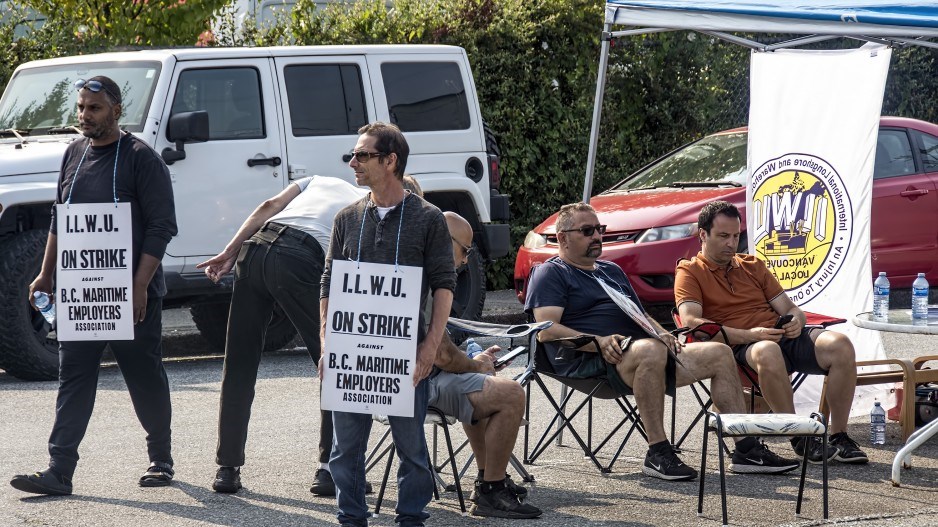The Canadian Federation of Independent Business (CFIB) wants the federal government to enact back-to-work legislation to end the strike by International Longshore and Warehouse Union sa国际传媒 (ILWU) that has disrupted container cargo movement through sa国际传媒 ports since July 1.
In a release today, the non-profit organization that represents more than 110,000 business owners and enterprises across the country said that preliminary results from a survey of its membership found that more than half say the strike is adversely affecting their business operations.
“Supply chains have just started to recover from the disruptions caused by the pandemic, so many businesses will feel this latest setback extra hard,” said CFIB president Dan Kelly. “We’re hearing from members across the country who are worried about missing critical sales, delayed production or orders or an inability to get their products to export markets because of the strike. The federal government must step in and get shipments moving again as quickly as possible.”
According to the CFIB survey, only 16 per cent of businesses said the strike would have no impact on them.
Numbers from the BC Maritime Employers Association (BCMEA) released on July 10 note that, with 28 consecutive work shifts lost thus far because of the ILWU strike, $7.5 billion worth of cargo, ranging from automotive parts and refrigerated goods to critical minerals and commodities, has been potentially disrupted.
The BCMEA noted that $800 billion per day in cargo has been compromised by the strike.
Aside from wages and benefits, key issues at the bargaining table are the union’s push for expanded rights to jobs connected with maintenance work at terminals and port operations that go beyond the movement of cargo. IWLU leadership also has concerns about the increased encroachment of automation into container terminal and other port operations.
The union is seeking wage increases of 11 per cent in the first year of a new contract and six per cent in the second year. It has been without a contract since the ILWU’s previous five-year deal expired at the end of March.
ILWU sa国际传媒’s counterpart in the United States recently reached a tentative agreement on a six-year deal with the Pacific Maritime Association (PMA) that provides for a 32 per cent wage increase over the term of the contract for the 22,000 unionized dockworkers employed at 29 ports along the U.S. West Coast.
In a July 10 statement, ILWU president Rob Ashton said his union’s attempts to secure a fair wage increase “have been blocked by shipping companies and terminal employers who have seen profits explode during the last three years.”
Citing a study by Jim Stanford, economist and director of Vancouver’s Centre for Future Work, Ashton pointed out that the world’s six biggest shipping lines control 70 per cent of global shipping and all six are BCMEA members.
. That earnings bonanza was driven largely by historic spikes in freight rates on the transpacific and other major trade lanes.
Ashton noted that, according to the study, “Clearly, labour is not the source of rising costs in marine shipping, and the resulting inflation. The greed of shippers and terminal operators, who took advantage of an economic and health emergency to fatten their bottom lines, is the source of the problem. Yet now business groups blame workers for disrupted shipping.”
In its July 3 statement expressing frustration over ILWU sa国际传媒’s negotiating stance, the BCMEA pointed out that the median annual ILWU sa国际传媒 salary in 2022 was $136,000, plus benefits and pension. The maritime employers group added that sa国际传媒 longshore wages have increased 40 per cent over the past 13 years and 10 per cent since the pandemic began.
But the CFIB says that unless the two parties can negotiate a new deal immediately, the federal government needs to step in and settle the dispute before more damage is done to businesses across the country and sa国际传媒’s economy.
“Enough is enough,” said Jasmin Guénette, the CFIB’s vice-president of national affairs. The federal government can't just stand on the sidelines with its arms folded. They need to intervene quickly. Small businesses cannot continually bear the brunt of service and supply chain disruptions.”
twitter.com/timothyrenshaw



